Interview With Amy Champeau
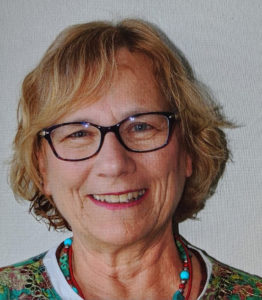 I met Amy Champeau in Los Angeles. We both came to the Antioch MFA Creative Writing Program post- 50. Amy has had a rich life that informs much of her writing. From a divorce which led to homelessness to a successful psychotherapy practice, Amy has much to share on the page, and to my great joy, to share with us in this interview! We pick up where Amy is describing a small group workshop at Antioch led by a literary agent. Spoiler alert: the agent is interested in Amy’s book idea. I think you will be too!
I met Amy Champeau in Los Angeles. We both came to the Antioch MFA Creative Writing Program post- 50. Amy has had a rich life that informs much of her writing. From a divorce which led to homelessness to a successful psychotherapy practice, Amy has much to share on the page, and to my great joy, to share with us in this interview! We pick up where Amy is describing a small group workshop at Antioch led by a literary agent. Spoiler alert: the agent is interested in Amy’s book idea. I think you will be too!
Your Story Has Legs!
Diane: Tell me about this small group thing.
Amy: So I was like, “Okay, anything that comes by, I sign my name onto it.” I don’t want to miss an opportunity even if I don’t think I’m qualified. I can always decide not to do it later. So I put my name in and was selected to meet with this agent in a small group. She went around and asked everybody what questions they had. I didn’t feel far enough along on anything to have a question.
So I said, “Well I don’t really have a question. I’ll just listen.” Then she came around again. I still didn’t have a question. The agent had just spoken about how she doesn’t like memoir and how it’s not an easy sell, and then she asked me, “Well what are you working on?” I told her I was working on a book about psychological abuse. When she asked me about myself, I said, “I’m a Jungian analyst. The book would have clinical stuff and memoir.” She said, “Well that has legs.”
Diane: Woohoo!
Amy: She said, “Write that up. Get the manuscript done. Put the proposal together.”
After the residency, I sent her an email. “When I have that ready, would you be willing to look at it?” and she said, “Yes, send it to me.”
Diane: Whoa. That’s wonderful.
Amy: I don’t know if that’s wonderful or not, but I thought, “Well, that gave me a boost.” Like sometimes you just think, “What am I doing? Is anything ever really going to happen?”
“It Was Nice to Find a Woman Mentor Who Would Be More Like My Audience”
Diane: Where are you in the process of getting a proposal together?
Amy: Not very far because you have to have the manuscript completed before you send the proposal. I have to finish my final manuscript for Antioch. I’m graduating in June.
Diane: I may be there, doing a PDS (professional development seminar).
Amy: You’re a good role model for me because you keep seeking out people to help you.
Diane: I do. It takes a freaking village. That’s my motto. It takes a village.
Amy: Right now, I’m just trying to finish the program, but I’m thinking about, “What am I going to do after that? How is my community going to look?”
Diane: You have to create it.
Amy: I’m so relieved to have Terry Wolverton as my mentor now because it’s kind of been a bumpy road for me. It was nice to find a woman mentor who would be more like my audience.
I still don’t feel like what I’m writing is so beautiful or anything, but I feel like I’m in the zone with the topic area.
“One of the Things I’m Writing About Are Experiences Pre-MeToo in the World of Work”
 Diane: Tell us about your topic area.
Diane: Tell us about your topic area.
Amy: Well I’m 68 years old, which isn’t the most ancient person in the world, but I’ve had a lot of life experiences that are now relevant. One of the things that I’m writing about are experiences pre-MeToo in the world of work.
I was married at 18 and then had two kids. I didn’t have a college education and was a stay-at-home mom, doing a lot of canning and cooking—I was a hippie in the ’70s, a back-to-the-earth person. My ex-husband and I had a business together. But when that marriage ended, I became really destitute and was homeless for a while. I was devastated. I wasn’t really functional and lost everything in my life.
I lived in a small town in Wisconsin at the time. No one I knew was divorced. I didn’t have any money for a lawyer. So, in the legal process, because I didn’t have money for representation-
Diane: You got screwed.
Amy: I really got screwed. I basically had to start my life over and figure out how to live and support myself mentally, emotionally, and physically. It took me a long time to recover from all of that.
“I Lived in My Car. Fortunately, There Were People That Stepped Forward to Help”
Diane: So what did you do? You said you were homeless. Where did you sleep?
Amy: I lived in my car. Fortunately, there were people who stepped forward to help. People offered me a place to stay-
Diane: Friends? Family?
Amy: Some were strangers. I moved to bigger town to look for work. I got a job as a graphic designer in a college student union. Through that, I met a lot of people who were a lot younger than me-
Diane: How old were you at the time?
Amy: I was 36. I met this young woman, and she said, “My mom knows someone who rents out rooms, I think.” So she connected me with this family, and I eventually rented a room from them. For the 18 years before that, I’d owned a home and …
I was disoriented, anxious, and panicky, shaking all the time. It was really hard. The people at the crisis line I was calling every night got to know me.
Diane: That’s great that you called a crisis line.
“I Went to See This Wonderful Therapist. All I Did Was Cry”
 Amy: Yeah, I didn’t know what to do. I was trying to be resourceful because there was no one around. I was just desperate to find my way, so I called crisis lines.
Amy: Yeah, I didn’t know what to do. I was trying to be resourceful because there was no one around. I was just desperate to find my way, so I called crisis lines.
They said, “Well we talk to you every night. We think you need help. We have funding in our county, so we’re going to have you evaluated by someone.” They sent me to a psychologist who said, “I can either put you on medication or send you to therapy.” I was afraid of medication, so I went to see this wonderful therapist. All I did was cry. I sat there every day in my torn-up jeans, holding on to a teddy bear in her office and crying.
I was called a “displaced homemaker,” somebody over the age of 30 who had spent most of their time taking care of family members, who had been out of the workforce for a long time, and was unable to get unemployment or was under-employed. They had funding for me to take a course, so they tested me, and I came out high in attorney or psychotherapist.
Diane: There you go.
“There Was Sexual Harassment from the Very Get-Go”
Amy: Somebody said, “Why don’t you train to be a paralegal because you can do that really quick and then you can earn some money.” At that time, there were hardly any paralegals. It was a brand-new field, so I took that course and did pretty well. The director said, “We have a lawyer on our board, and I think he should hire somebody, so we’re recommending you.”
It was $12 an hour. I could not really support myself, and there was sexual harassment from the very get-go. I was just this scared person—an intelligent person, but not a professional person. Right there in the job interview, this man who was a prominent attorney in the community (he’d been the DA and was now a criminal lawyer) started asking me personal questions, like if I was married and how old I was. You can see how old a person is when she fills out an application, but he asked me if I was dating somebody and what my sex life was like, and all of-
Diane: Oh my God.
“I Didn’t Know What to Do Because Who Would People Believe: Me or Him?”
Amy: Yeah, it was terrible, but at the time, people weren’t so knowing. In those days, a lot of employers were worried that women would become pregnant or get married and have to move away, or something like that. He was asking questions, which now are probably illegal to ask. Actually, there was already legislation that made these things illegal, but I didn’t know that then.
I was this person who desperately needed employment, and he was the person in power. Anyway, nobody knew what a paralegal was. He didn’t know what one was, but he was on the board of this school, so he hired me. I never even thought about those questions again. I thought that once I was in the job, everything would be above board.
He took me into his office and started talking about a case. When we were done, and I got up to leave, he pushed me up against the wall. This went on for some time. I didn’t know what to do because who would people believe: me or him? I was a person just out of homelessness, and he had been the DA. He became bolder and bolder. It was really confusing for me, but one day, a legal secretary came into my office and said, “Is so-and-so attorney bothering you? He’s bothered every woman who’s ever worked here, and nobody’s ever done anything.”
Diane: Wow.
“I Was His Therapist 20 Years Before I Actually Became a Therapist”
Amy: She told another partner in the firm, with whom I had become friendly. I didn’t do much work for him, but he would come into my office every evening after work and talk to me about his life. About an affair he had, the woman he married, how he had been in the military, and how unhappy he was being a lawyer.
I thought, “Why is this person talking to me?” This old man with this booming voice that everybody was scared of—that I was scared of. He was coming into my office a couple of times a week, talking to me about his life. I was his therapist 20 years before I actually became a therapist. When he heard his partner was bothering me, he came into my office and he said, “My partner is never going to talk to you again. You’re going to only work for me.” I never had anything to do with that abusive person again.
Diane: Wow, that’s great.
Amy: So that is one of the things that I’m writing about.
Diane: I love that.
Amy: It’s pre-MeToo, but also the “every woman” situation-
Diane: Oh, it’s the “every woman” story for sure.
Amy: I also wrote some essays about being Jewish and my felt sense of never being safe in the world.
I’m including some research on the intergenerational transmission of trauma and evidence that DNA changes through the generations.
Diane: Is your book like a series of essays, or …?
“As a Therapist and a Psychoanalyst, I Thought, “If This Is Happening to Me, This Is Happening to A Lot of People”

Amy: Well that might be a different book. The book that I was originally going to write was about my experience of psychological abuse. As a therapist and a psychoanalyst, I thought, “If this is happening to me, this is happening to a lot of people. They may not even know what’s happening to them, so I should do something about this.”
Diane: Was your psychological abuse in your marriage?
Amy: I’ve been married more than once, but I’ve had one marriage in which it was really pretty blatant, and it escalated. It’s complicated, but there were a lot of power issues in my marriage. There were a lot of layers of abuse: there was some spiritual abuse, but it really wasn’t physical until one point at which he pulled a knife on me.
I became traumatized and didn’t know what to do. I went out to lunch with a friend, who said, “We’re going to the sheriff.”
Diane: Good friend.
Amy: Yeah, I had a lot of good friends, thank goodness. They knew there were power dynamic issues in my marriage. Some friends were more forceful than others about my needing to leave, but I wasn’t really ready to do that.
This friend said, “We’re going to the sheriff. I’ll go with you and sit with you, but then I have to go to work.” All my friends were therapists. I’m blessed with good friends. Probably I’m not so deserving of that, but they put up with my-
Diane: Meshugaas, right?
“I Imagined He Drove a Big Old Truck and Had Dogs in the Back and Guns and Everything”
Amy: Yeah, right. I’m a nice person, but I have better friends than I think I’m a friend to them.
Diane: I bet they disagree.
Amy: Oh they probably disagree because they’re still there, but anyway, the friend went with me. It was a male sheriff, dressed like a stereotypical sheriff with, you know, a beige shirt and a crew cut. I imagined that he drove a big old truck and had dogs in the back, and guns, and everything. My friend had left by then. I told the sheriff what had happened. He asked me if it could’ve been a mistake and I said, “No. I think that my husband was trying to intimidate me and threaten me.” The sheriff said, “Intimidating a person with a weapon is a crime, and we’re going to investigate.” They went to my husband and he admitted it.
Diane: He made it easy.
Amy: He made it easy. All of this was a learning experience. I knew that I had to do something when the knife came out.
Diane: Definitely.
Amy: At that point, the line had been crossed. I was really clear that this couldn’t continue. I was going to ask him to leave, but I couldn’t really enforce that because we were co-owners of the house. So, I ended up doing something legally. Fortunately, even though Arizona is considered a very red state, which is changing, the laws are really pretty good around domestic violence.
Diane: Good.
“My Life Is Different. I’m Single, and I’m Happy”
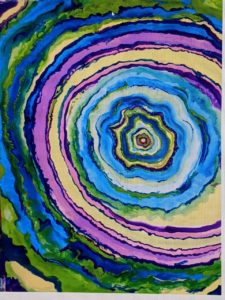 Amy: Once you make a complaint of domestic violence, you cannot take it back. It belongs to the state. That’s to prevent the perpetrator from putting pressure on the victim.
Amy: Once you make a complaint of domestic violence, you cannot take it back. It belongs to the state. That’s to prevent the perpetrator from putting pressure on the victim.
He went to some classes and we divorced. I still have contact with him, but I have very firm boundaries. My life is different. I’m single, and I’m happy.
A lot of my clients have the same problems. Most of them are professional women. I’ve read that high-achieving women, are often less likely to report abuse because of the shame of it and because they believe they can accomplish whatever they set their mind to do, so if their marriage is in trouble, they should be able to fix it.
Diane: I think what’s so fascinating is that people would assume that you would “know better.”
Amy: Yeah, people would think that I know better, and yet the women that I work with, some of them are therapists too. Nobody’s immune-
Diane: That’s right.
“That Kind of Abuse Is Like the Frog in the Pot”
Amy: That kind of abuse is like the frog in the pot. You’re in it with this person who is not a bad person. You fell in love with this person, and then little by little, the heat is turned up and you’re thinking, “This is terrible.” But then there are other things that aren’t so terrible-
Diane: That’s right.
Amy: And then, I was different than a lot of people because I had such a good support system. Some of the clients I work with become more and more isolated. They give up their friends because their partner doesn’t like them. I never did that, which was a good thing. I had people in my life who were always pointing out to me what I should be seeing. That allowed me to see things sooner, maybe, than somebody else might.
Diane: You know, I think this story has, what’d that agent tell you? Legs? I think it has legs and arms and a body. I think it’s really amazing.
It’s a great topic. A needed topic, and you have authority on several counts: first of all, you’ve lived it. That’s the authority right there, and you’re in the biz, right, as a therapist. I mean … your perspective is so multilayered.
Amy: One prospective mentor said to me, “Are you sure you want to be out in the world talking about this?”
Diane: Oh, why not?
Amy: I think part of my hesitation is … I just feel it’s the same thing as if you were going to write about an abusive parent who was still alive. I think I can handle it, but right now, I’m just focusing on writing the story-
Diane: That’s right.
Amy: I’m not thinking about what I’m going to do with it, because if the story is meant to be told, it will be told in some way. I’m 68. I have to hurry up and do it, you know?
“You Either Learn How to Give Something Back into the World or You Lose Ground and Traction”
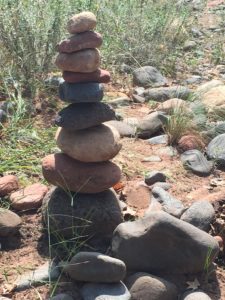 Diane: Okay, so I want to talk a little bit about that because, I think our age is such a gift. At our age, we’re serious, you know?
Diane: Okay, so I want to talk a little bit about that because, I think our age is such a gift. At our age, we’re serious, you know?
Amy: Yeah, there’s urgency.
Diane: There’s urgency. I think that’s a gift.
Amy: I do too. It really puts some focus. I think it was Erik Erikson, the psychologist. He talked about generativity versus despair as you get older. You either learn how to give something back into the world or you lose ground and traction. At this point, I’ve lived a lot of experiences and … I mean I’ve always wanted to write a book. My whole life. My dad wrote so many books.
Diane: Did he? I didn’t know that.
Amy: Yeah. My dad was a researcher who wrote over 75 books.
Diane: What was his topic?
Amy: He wrote about aviation in the ’50s. He was an aviation engineer and then went back and got his degree in journalism, so he was kind of a journalist who wrote about aviation. Then he wrote about the space race and then started writing books for young people about sports figures.
Diane: Wow.
Amy: He wrote a bunch of music encyclopedias.
Diane: Wow.
Amy: He supported our family of six by writing books, which was quite a feat. This was in the days before the internet. He was like a go-to guy about these things.
Diane: Would you mind telling us his name?
Amy: His name is Irwin Stambler. I have a lot of writers in my family.
Diane: It’s in your blood.
Amy: In my blood, you know, in my intergenerational transmission.
“As I Got Older, I Had the Feeling of Not Being Safe in the World”
Diane: When you say the “intergenerational transmission of trauma” you related that to Judaism. How do you see that playing out in your life?
Amy: It’s traditional for Jewish parents to name their children after deceased relatives. I was named for two great-aunts who died in the Holocaust. Part of the idea of naming somebody after someone is that you carry the legacy of that person. The deceased person benefits from the good life you’re living and the living person benefits from what’s been passed on.
I always felt some responsibility or burden carrying that. As I got older, I had the feeling of not being safe in the world. I guess somebody could diagnose me with generalized anxiety disorder.
Diane: Was that tied to being Jewish?
“There’s More Than What the Situation is Warranting Here. What’s That About?”
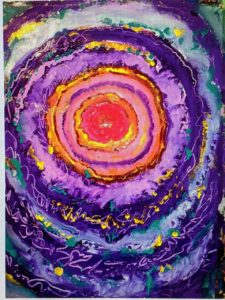 Amy: For a long time, it wasn’t. I was just a worrier. That was my nature, my constitution. Then … as I got older, I started to think about whether there was some kind of connection between how I felt in the world and my ancestral heritage. I experienced some anti-Semitism directed at me throughout my life. Not a ton, but of course I was aware. I remember that I started trying to make the connection. I could see why I felt anxiety when I was homeless or when I was going through something, but when times were good, I still felt that way. It was like, “There’s more than what the situation is warranting here. What’s that about?”
Amy: For a long time, it wasn’t. I was just a worrier. That was my nature, my constitution. Then … as I got older, I started to think about whether there was some kind of connection between how I felt in the world and my ancestral heritage. I experienced some anti-Semitism directed at me throughout my life. Not a ton, but of course I was aware. I remember that I started trying to make the connection. I could see why I felt anxiety when I was homeless or when I was going through something, but when times were good, I still felt that way. It was like, “There’s more than what the situation is warranting here. What’s that about?”
Recently, I started doing some research. There’s research that looks at Holocaust survivors and survivors of 9/11 and at Vietnam veterans. One of the findings was that even when they set up clinics for Holocaust survivors themselves, the people that were actually going to the clinics and experiencing symptoms were the descendants of the survivors. The most reasonable or useful diagnosis for children and grandchildren of Holocaust survivors is generalized anxiety disorder, which is what I’ve always felt.
Diane: Does that knowledge help to alleviate some of it?
“By Doing That Research, I Felt Connected to People I Don’t Know”
Amy: It makes me feel less crazy. When people would see me, they wouldn’t think that I felt that way because I don’t look anxious particularly. I felt kind of alone. You try to explain it to people, but they don’t really connect.
By doing that research, I felt connected to people I don’t know. There are a lot of people out there like me. Even though I may still feel anxious, I can say to myself that it’s not something wrong with me. That’s important. It’s something that maybe isn’t even about me. That’s helpful.
Diane: That is. You know, as you’re talking, I’m remembering when my kids were small. We were in a neighborhood that had quite a few Jews, but my neighbors across the street were not Jewish. I would look outside the window and think, “If there was another Holocaust, would they take us in?” I even flirted with the idea of keeping cyanide in the house just in case-
Amy: Oh wow.
“I Think Throughout My Life, I’ve Wondered How Safe It Is to Be Out as a Jewish Person”
Diane: Crazy, right? I feel like … when there’s cultural trauma … that kind of thinking gets woven in.
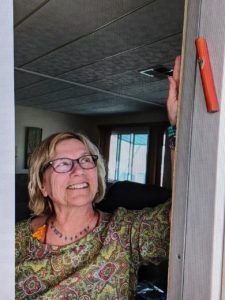 Amy: Yeah. It becomes part of the fiber of our being. I appreciate you sharing that. It’s these things that flick through your mind like, “How safe is it to wear Jewish jewelry?” How “out” can I be?
Amy: Yeah. It becomes part of the fiber of our being. I appreciate you sharing that. It’s these things that flick through your mind like, “How safe is it to wear Jewish jewelry?” How “out” can I be?
I think throughout my life, I’ve wondered how safe it is to be out as a Jewish person.
Diane: I have too. I, for one, and I’m sure many, many women, and hopefully some men, would really love to pick up your essay book. So now you have two books! The essay book and your psychological abuse book. I’m excited. Get on it, honey! I want to read them!
Amy: It’s very kind of you to say that. There’s vulnerability even to say what you’re working on, especially if you’re a nonfiction writer, I think-
Diane: Get over it! At this stage of the game, it’s like whatever, right? I think the more practice putting it out there, the less scary it feels, at least for me.
Amy: Yeah. I think that’s true. That’s part of the growing edge.
“I’m Not That Private of a Person. Writing’s Just Doing It on a Larger Scale”
Diane: I’ve learned that putting myself out there on a real personal level didn’t kill me, even though it was scary.
Amy: Yeah, I think that I’ve been doing that for a lot of my life. It’s just a different platform. I was involved with 12-step groups, where you see the value of telling your story. I was in my twenties, and I think that had a big impact on me about that sharing.
Diane: Sharing warts and all.
Amy: I’m not that private of a person. Writing’s just doing it on a larger scale.
Diane: Yeah, doing it on a larger scale and not knowing who’s going to see it.
Amy: I know.
Diane: Even if you’re not a very private person, you still choose who you share things with, right? With books and essays, that’s out of your hands.
I’d like to switch gears a bit. Tell me about your psychotherapy practice.
“My Work Has Been Described as a ‘Blend of Practicality and Spirituality’”
Amy: I’m a Jungian psychoanalyst, licensed marriage and family therapist and somatic psychotherapist with over 25 years experience. My work has been described as a “blend of practicality and spirituality.” I specialize in the treatment of trauma and PTSD, anxiety and fears, creative blocks, depression, relationship issues, as well as issues related to spiritual development, women’s bodies, the aging process and recovery from psychological abuse.
My work is informed by my life journey. I am a firm believer in the importance of practice and am an active participant in teaching my clients tools and practices that lead to real and lasting change in body/mind/emotions/spirit. I also provide education and consultation to other mental health professionals.
My most important work, though, has been raising my two children. They are now 50 and 47 years old and have five children between them.
Diane: How does someone who wants to work with you find you?
Amy: My office is located in Tucson, Arizona. I see clients in my local office but also remotely by phone and internet.
“In Moment-to-Moment Painting, We Paint for Process Not Product”
Diane: That’s great!
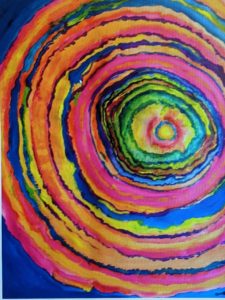 Amy: I’m also the founder of Moment-to-Moment Painting.
Amy: I’m also the founder of Moment-to-Moment Painting.
Diane: What’s Moment-to-Moment Painting?
Amy: It’s an intuitive process and practice which utilizes the flowing medium of paint for self-discovery, experimentation and contemplative expression. In Moment-to-Moment Painting, we paint for process not product, we recover the playful freedom of young children, and learn to work through negative and self-limiting self-talk that blocks the creative flow. We learn to allow emotions to release in a safe environment. As we face the white canvas, we learn to live with awareness in each moment. We learn that painting can become a practice and a refuge. I’ve sent you some of my mandala paintings done over the last several years using this approach.
Diane: They’re beautiful! I could use some of that!
Amy: Group and individual sessions are available!
Diane: You’ve also mentioned yoga. How has the practice changed your life?
Amy: I am a practitioner of meditation and hatha and kundalini yoga as taught through the Isha Foundation, an international non-profit organization dedicated to raising human consciousness, founded by Sadhguru, a living realized master, yogi, mystic and visionary.
“I Spend Between One and Three Hours at Home Each Day Doing the Kriyas”
It’s different than the type of yoga in which the practitioner goes to a weekly class. Instead, in Isha hatha yoga, one learns sets of postures called kriyas which are specifically designed by Sadhguru to produce certain energetic effects in the practitioner. After learning a kriya in a workshop that takes two to four days, the practitioner is prepared to practice at home on her own.
I spend between one and three hours at home each day doing the kriyas along with meditation. After doing these practices for six months or so, I effortlessly lost weight, gained more energy, felt more blissful, joyful and grateful. My blood pressure dropped, and I easily gave up all stimulants – caffeine, sugar, etc. It’s become a way of life.
Diane: Sounds wonderful. Before we sign off, do you have anything else you want to add?
“This Is the Time in My Life When I Have Felt the Absolute Best”
Amy: Well, I know that you’re talking to women over 50.
Diane: Yes.
Amy: I would just like to say that this is the best time in my life.
Diane: That’s so wonderful, isn’t it?
Amy: I just really wanted to say that. I feel good physically and feel like I’ve come into my own as a human being. I really love the company of women around. There are a lot of women who are … over 50 or over 60 and they’re vibrant. I live in a 55+ community. It’s really beautiful, and there are all these women like me. We get together and have spiritual groups and book discussions, and theater groups and TED Talk groups. I’m still working full-time, but there’s so much opportunity. This is the time in my life when I have felt the absolute best, so I just wanted to say that.
Diane: I appreciate that. Thanks. And I’m with you on that. It’s a great time, but we don’t acknowledge it enough. So, I really appreciate you saying that.
And I’m very excited for what’s to come for you.
Amy: I am too.
Diane: All good things.
If you’d like to learn more about Amy Champeau and her services, please see her listing in Psychology Today: https://www.psychologytoday.com/us/therapists/amy-sprague-champeau-tucson-az/82108
As always, I’d love to hear your thoughts. Please leave a comment or send me an email.
Stay healthy, and see you April 6th!
XOXO
Diane



I know Amy through the MFA program, so was delighted to have this opportunity to learn more about her. What an interesting conversation you had with each other! I was impressed with the foundation of good friends in Amy’s life, & can absolutely understand why they would want to be in her life; she’s wise and generous with her knowledge- much like you, Diane 🙂 Her resilience and strength are inspiring.
I’m looking forward to reading her books too.
Thank you for another engaging post!
Thank you, Sarita, and back at you!
I am so very grateful to have been in the MFA and to have met so many wonderful women who have struggled and learned and grown and are living on their own terms–unapologetically.
XO
Diane, another impressive interview with another impressive woman! I am fortunate enough to know Amy and I can’t wait to read her book! I know that her writing will help so many women who have faced (or are facing) unthinkable circumstances. We need more examples of women like Amy who are going strong at 68, pursuing dreams and expressing themselves creatively. I am so inspired by her!
Me too, Sherry! I can’t wait for the book and find Amy and her story incredibly inspiring! Thanks for sharing!
This is my absolute favorite column of yours. What an incredible woman she is. Everything she says about that insidious form of frog-in-the-pot abuse rings so hideously true to me. Full speed ahead in writing those books! XO
Thanks, Alison! Amy is incredible and so spot on with the frog-in-the-pot. Can’t wait to read her books! XO